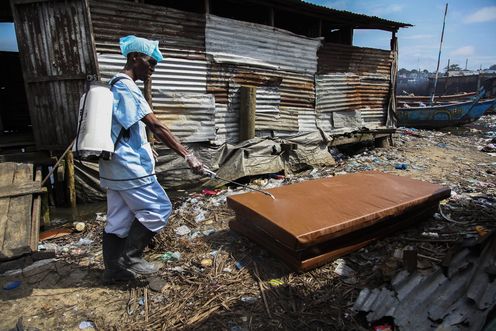
The extent of the current Ebolavirus outbreak in West Africa has belatedly focused the attention of non-governmental organisations, local and Western governments, and international media. What we haven’t caught up with though, is the extent to which these outbreaks and their devastating effects are predictable and preventable.
The spread of Ebola virus occurs because health infrastructure in the region is fragmented, under-resourced, or non-existent. And the therapeutic response to the illness is constrained by failure of markets to drive drug and vaccine development that would help the world’s poorest people.
Resource constraints
This is the largest known Ebola virus outbreak, with more than 1,800 cases and 1,000 deaths so far. But the actual number of people affected and mortality rates are uncertain because laboratory diagnosis is limited and only severe cases are admitted to hospitals.
Apart from its longevity and extent, what distinguishes this outbreak is that, for the first time, there’s a prospect of drugs and vaccines to treat and prevent the disease. But these important therapeutic milestones don’t alter the fact that the outbreak will not be controlled by drugs. Rather, what’s required is strict infection control and quarantine.
Person-to-person spread of Ebola virus, by contact with blood, body fluids or tissues of an infected person (mainly in the late stages of disease or after death) is not particularly difficult to prevent by well-established infection prevention measures that should be routine practice in any modern hospital.
Unlike influenza, for instance, Ebola virus doesn’t spread by coughing or during the incubation period. So the current hospital outbreaks are related to inadequate health-care resources rather than a particularly high level of infectiousness.
Nor can we escape the fact that future outbreaks are more likely to be prevented by sociopolitical and environmental reform than vaccination. That’s because identifying target populations and delivering vaccines rapidly requires infrastructure and sociopolitical stability, both of which can be difficult to ensure during an outbreak.
A moral failure
But drugs and a vaccine are being sent to the region, after a ruling from an ethics panel convened by the World Health Organization decided their use was acceptable even though they haven’t been definitively shown to be safe or effective.
If anything, the vaccine and use of the drug ZMapp to treat two American missionaries, a Spanish priest, and three Liberian doctors have exposed the moral failings of scientific research, the biomedical and pharmaceutical industries and the neoliberal policies of global capitalism.
Ebola fever is not a new disease. That so little progress has been made towards developing effective remedies, and that the progress has been driven more by military imperatives than concern for affected communities, is outrageous.
Think about it this way: if Ebolavirus outbreaks had occurred in New York, London, or Sydney, effective therapies surely would have been developed long ago.
The reasons for the lack of effective drugs are complex. Drug and vaccine trials in tropical regions with limited infrastructure are difficult and costly, but other barriers seem even more insurmountable.
They include subtle forms of racism (manifest in our tolerance of different burdens of illness and different responses to disease according to race) and the moral erosion that comes with distance (and “otherness”); the global failure to address the root causes of poverty, systematic inequity and political instability; and the failure of market-driven drug development or the lack of incentives for Big Pharma to develop vaccines that will only be given once or twice, or drugs for which demand is limited and unpredictable.
These drugs include not only anti-Ebolavirus drugs but also new antibiotics, anti-malarials, and anti-tuberculous drugs. Indeed, malaria and tuberculosis have reportedly killed at least 300,000 and 600,000, respectively, since the start of the Ebola outbreak.
Despite these failures, there are well-established measures which, if applied promptly and adequately, should limit the extent and mitigate the effects of outbreaks. Four steps are required.
Four moves forward
The first is to maintain an emphasis on public-health strategies that are most likely to control the illness. And to provide affected countries with sufficient short- and long-term infrastructure support so they can work with communities to prevent and manage the outbreak.
The second is to accept that we must act to treat infection and reduce its spread, as the WHO has already done, by approving the fast-tracking of compassionate access to promising but still untested medications and vaccines.
In doing so, it’s essential the processes for making these therapies available are fair, equitable, transparent, informed and inclusive of affected communities. Difficult decisions about prioritisation that, for example, privilege health workers or exclude the elderly and terminally ill, are unlikely to be supported unless their bases are ethically justifiable.
The third is to review ethical and scientific standards for clinical trial design to increase flexibility in the face infectious disease emergencies. This can be done by expediting approval and commencement of drug and vaccine trials as soon as an outbreak begins, to hasten use of new therapeutics without compromising public safety.
The fourth most difficult but important step is to critically examine the sociopolitical and economic conditions that create the environment for such outbreaks occur.
The likelihood of outbreaks of disease due to Ebola and other viruses that jump from animals to humans increases when people are forced, by poverty, limited sources of protein (which is provided by “bush meat”), global capitalism and neoliberal market policies, into dangerous places and practices to survive.
Unless we confront these structural problems, genuinely consider alternative policies and strategies, such as new forms of taxation and market economics in line with public health goals, pooling of intellectual property to facilitate drug and vaccine development, and different approaches to science and science funding, the problems highlighted by this outbreak will be endlessly repeated.
The authors do not work for, consult to, own shares in or receive funding from any company or organisation that would benefit from this article. They also have no relevant affiliations.
